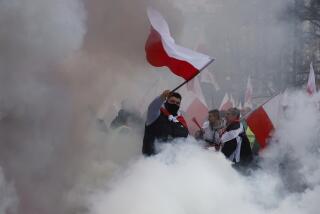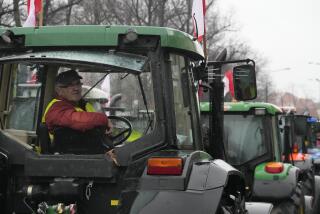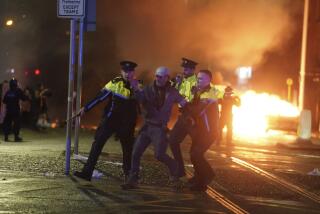Russian police detain migrants who were targets of riot
MOSCOW — One day after rioting youth demanded the eviction of migrant workers from outside Russia, police swept through the vegetable market that was the target of the violence, detaining about 1,200 workers and traders, most of them from the northern Caucasus region, news agencies reported Monday.
On Sunday, thousands of young people had taken to the streets in a southern Moscow suburb, overturning cars, breaking windows in street kiosks and attempting to break into the vegetable market run by migrants. The protests came in the wake of the killing last week of a 25-year-old ethnic Russian man, reportedly by an attacker who appeared to be of Caucasian or Central Asian origin.
Protesters chanted “Russia for Russians, Moscow for Muscovites” and threw stones at riot police. More than 20 people, including six police officers, were injured during the melee.
“On Sunday, extremist persons decided to take advantage of the situation. ... Many of them were drunk,” Anatoly Yakunin, a senior Moscow police official, said during an urgent meeting at police headquarters. “They were young people -- unfortunately, women among them too. They began to cross the legal line in actions bordering on mass disorders.”
Television reports showed groups of young men randomly attacking and beating people who didn’t look Russian. Thousands of police officers in full riot gear and armed with clubs patrolled the streets of the suburban Biryulyovo-Zapadnoye district overnight after the protests subsided.
Yakunin said 380 people were arrested in the unrest.
On Monday, police returned to the vegetable market, checking the documents of migrant workers and loading them into vans. Police spokesman Andrei Galiakberov described the roundup as part of a “preemptive raid” and said some detainees were being investigated for criminal connections. Police also said they found a car full of cash and unlicensed arms.
Sunday’s unrest was the worst ethnic violence in Moscow since Dec. 11, 2010, when more than 5,000 people rioted in front of the Kremlin, angered by the death of a soccer fan killed by a man from the northern Caucasus.
More than 2 million migrants work in Moscow, most in trade and construction. Those from Central Asia and the Caucasus, generally darker skinned than ethnic Russians and often Muslim, face virulent discrimination and have been frequent targets of violence and police crackdowns.
“The state does very little to socialize these migrant groups and help them adjust properly,” Alexander Cherkasov, board member of Memorial, a Moscow-based rights group, said in an interview. “Thus, markets where they work often turn into migrant enclaves, which the authorities fail to control properly. As a result, they appear incapable to prevent local incidents from deteriorating into mass riots like the one in Biryulyovo, richly colored with ethnic intolerance.”
The latest violence began Thursday with the stabbing death of a man identified as Yegor Shcherbakov. His girlfriend told the NTV television channel that he had been trying to protect her from an attacker of “non-Russian” appearance.
“This non-Russian man took out a knife and stabbed him in the heart,” said the girlfriend, whose name was not disclosed. “We called the ambulance, but we couldn’t save him, and he died on my knees.”
The suspect’s face was caught by a surveillance camera, and police were searching for him. People brought flowers and lighted candles Monday morning at the spot where Shcherbakov was killed.
Rushan Abyasov, deputy head of Russia’s Council of Muftis, a Muslim umbrella group, lamented that an ordinary crime had been used to artificially widen ethnic divisions.
“This is a very dangerous tendency,” Abyasov said in an interview. He said police should have checked the status of traders regularly rather than conducting a sweep after the disturbance.
ALSO:
Coalition soldier fatally shot in Afghanistan
Iran to offer ‘road map’ for resolving nuclear dispute with West
Four kidnapped Red Cross, Red Crescent workers released in Syria
sergei.loiko@latimes.com
More to Read
Sign up for Essential California
The most important California stories and recommendations in your inbox every morning.
You may occasionally receive promotional content from the Los Angeles Times.










